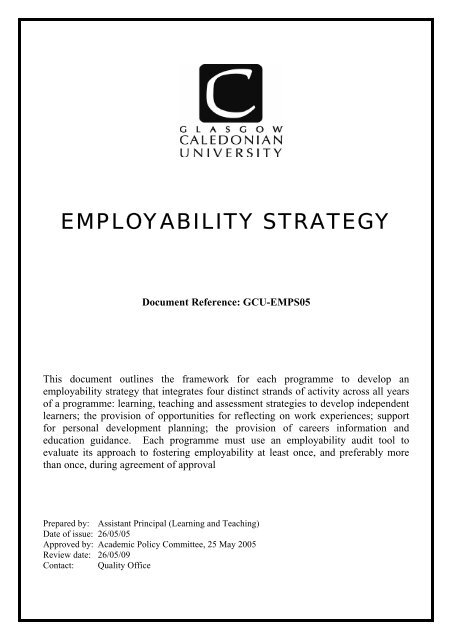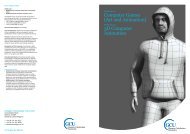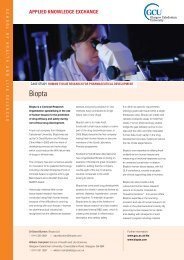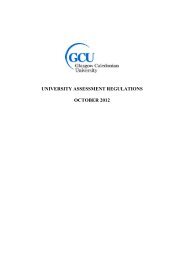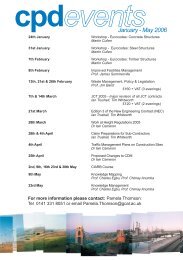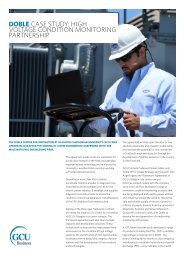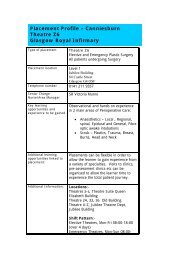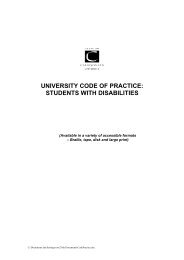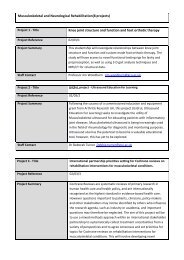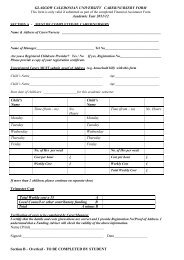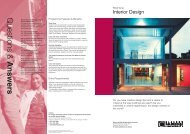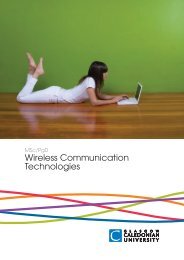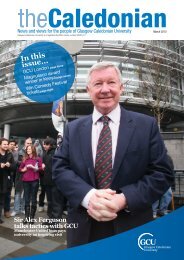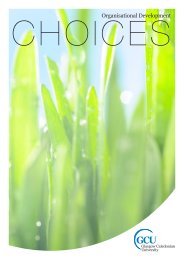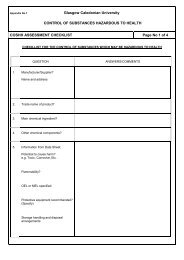GCU employability strategy - Glasgow Caledonian University
GCU employability strategy - Glasgow Caledonian University
GCU employability strategy - Glasgow Caledonian University
Create successful ePaper yourself
Turn your PDF publications into a flip-book with our unique Google optimized e-Paper software.
EMPLOYABILITY STRATEGY<br />
Document Reference: <strong>GCU</strong>-EMPS05<br />
This document outlines the framework for each programme to develop an<br />
<strong>employability</strong> <strong>strategy</strong> that integrates four distinct strands of activity across all years<br />
of a programme: learning, teaching and assessment strategies to develop independent<br />
learners; the provision of opportunities for reflecting on work experiences; support<br />
for personal development planning; the provision of careers information and<br />
education guidance. Each programme must use an <strong>employability</strong> audit tool to<br />
evaluate its approach to fostering <strong>employability</strong> at least once, and preferably more<br />
than once, during agreement of approval<br />
Prepared by: Assistant Principal (Learning and Teaching)<br />
Date of issue: 26/05/05<br />
Approved by: Academic Policy Committee, 25 May 2005<br />
Review date: 26/05/09<br />
Contact: Quality Office
Employability in Programmes<br />
1 Introduction<br />
1.1 Background<br />
1.1.1 Definition<br />
Employability is defined as: “a set of achievements – skills, understandings and personal attributes<br />
– that make individuals more likely to gain employment and be successful in their chosen<br />
occupations” [1].<br />
1.1.2 Economic Context<br />
Employability is important because a good supply of highly-skilled employable graduates is<br />
essential for national economic and social well-being. The EC envisages Europe becoming the<br />
world’s leading knowledge economy by 2010 [2] in the face of strong competition from other large<br />
economic regions where many governments are also taking strategic actions to develop the potential<br />
of their population such as widening participation in higher education. The UK job market is<br />
working reasonably well and employers are broadly content with the learners they recruit from<br />
colleges and Higher Education Institutions (HEIs). However a common complaint from employers<br />
is that many graduates have a deficiency in soft skills and are also unable to demonstrate<br />
sufficiently well that they have the skills and attributes employers are seeking [3]. Many careers are<br />
and will continue to be diverse and will include periods of voluntary work, home and family-based<br />
work, retraining. To be able to adapt people will need to be retrain and rely on a broad range of<br />
selection and planning skills. A person’s <strong>employability</strong> depends on a combination of their own<br />
skills, understandings, and attributes, and external influencing factors such as employers’<br />
recruitment policies, ethnic background, socio-economic group, employment sector, gender. The<br />
challenge for the HE sector is to enhance the employment opportunities of the full spectrum of its<br />
graduates in the face of these external factors.<br />
1.1.3 Employability at <strong>GCU</strong><br />
<strong>GCU</strong>’s strategic response to <strong>employability</strong> was to approve (Senate, April 2004) the Partners in<br />
Delivery project (PiD) to develop graduates who are characterised as dynamic, confident,<br />
innovative, inclusive, responsive, and entrepreneurial, reflecting the 2010 vision of our <strong>University</strong>,<br />
and who are valued by employers. PiD addresses the <strong>GCU</strong> LTAS themes 1 of Employability;<br />
Personal Development Planning; Careers Education, Information and Guidance. Senate agreed the<br />
following policies for each programme:<br />
• each programme must embed <strong>employability</strong> attributes within its modules<br />
• each programme must make explicit the assessment plan for these skill areas<br />
• each programme must strive to give as many students as possible credited work<br />
experience<br />
• each programme must encourage all students to compile a portfolio of their work as a<br />
demonstration of <strong>employability</strong> assets<br />
• each programme must have a <strong>strategy</strong> for embedding these skills within the curriculum.<br />
1.2 Purpose<br />
The purpose of this paper is to propose a <strong>strategy</strong> framework for each programme to develop an<br />
<strong>employability</strong> <strong>strategy</strong>.<br />
1 The <strong>Glasgow</strong> <strong>Caledonian</strong> <strong>University</strong> Learning, Teaching and Assessment Strategy (LTAS) for 2003 – 2006 identifies<br />
5 enhancement themes: Employability; Personal Development Planning; Careers Education, Information and Guidance;<br />
Academic Guidance; Student Induction.<br />
2
2 Fostering Employability<br />
Fostering <strong>employability</strong> is about helping learners to build on their previous experiences – in school,<br />
work, in life, to help them be more likely to gain employment and be successful in their<br />
occupations. A university has little influence over external factors e.g. state of labour market,<br />
learners’ personal circumstances, but it can offer its learners opportunities to engage in learning and<br />
assessment opportunities to enhance their <strong>employability</strong>. Universities have traditionally attended to<br />
issues of <strong>employability</strong> in education but often without a coherent strategic approach and hence some<br />
learners do not receive the assistance they need to develop their <strong>employability</strong> [4].<br />
One valuable model for helping to foster <strong>employability</strong> is the USEM model (Understanding, Skilful<br />
practices, Efficacy Beliefs, Metacognition) [5], adopted by the Higher Education Academy<br />
Enhancing Student Employability Co-ordination Team (ESECT) who have developed some best<br />
practice guidelines for enhancing <strong>employability</strong> 2002-2005. In the USEM model, fostering<br />
<strong>employability</strong> has 4 characteristics:<br />
Understanding: propositional knowledge in the form of the subject matter of the degree<br />
Skilful practices: subject-specific and generic skills, often characterised as procedural<br />
knowledge<br />
Efficacy Beliefs: belief that one can generally make some impact on situations and<br />
events.<br />
Metacognition: awareness of what one knows and can do and of how one learns more.<br />
SHEFC [6,7] defined the concept of <strong>employability</strong> as a set of <strong>employability</strong> assets:<br />
Academic skills: includes specialist knowledge, ability to apply knowledge, logical thinking,<br />
critical analysis, problem-solving, written and spoken communication, ability to use numerical<br />
data, computer literacy and research skills.<br />
Personal Development Skills: includes self-confidence, self-discipline, self-reliance, awareness<br />
of strengths and weaknesses, creativity, independence, knowledge of international affairs, desire<br />
to go on learning, ability to reflect, reliability, integrity, honesty and regard for others.<br />
Enterprise or business skills: includes entrepreneurial skills, ability to prioritise tasks, time<br />
management, interpersonal skills, presentational skills, ability to work in teams and leadership<br />
skills, commercial awareness, flexibilty, innovation, independence and risk-taking.<br />
Fostering<br />
Employability<br />
(USEM Model)<br />
Develop<br />
Understanding<br />
Develop<br />
Skillful<br />
Practices<br />
Develop<br />
Efficacy<br />
Beliefs<br />
Develop Meta-<br />
Cognition<br />
Employability<br />
Assets<br />
(SHEFC Framework)<br />
Academic Skills<br />
Business Skills<br />
Personal Skills<br />
<strong>GCU</strong> Student<br />
Profile<br />
dynamic, confident, innovative, inclusive, responsive, entrepreneurial<br />
Figure 1: USEM Model, SHEFC Employability Assets, <strong>GCU</strong> Student Profile<br />
These assets can be summarised by the <strong>GCU</strong> student profile i.e. dynamic, confident, innovative,<br />
inclusive, responsive, and entrepreneurial.<br />
3
Figure 1 shows that the USEM model recommends the activities needed to achieve the <strong>GCU</strong><br />
student profile. The challenge is for each programme to develop an <strong>employability</strong> <strong>strategy</strong> that<br />
integrates these activities.<br />
3 A Programme Employability Strategy Framework<br />
There is no one <strong>employability</strong> <strong>strategy</strong> that is appropriate across each programme since discipline<br />
contexts, student recruitment patterns, and envisaged labour markets differ for each programme.<br />
Figure 2 shows a programme <strong>employability</strong> <strong>strategy</strong> framework that proposes that <strong>employability</strong><br />
strategies must integrate 4 primary activities across all years of a programme. Integration is critical<br />
because it helps to reinforce key ideas for students. For example PDP can be used to reflect on<br />
work experience and career options in the context of the academic discipline.<br />
Integration<br />
Level 1<br />
Learning,<br />
Teaching &<br />
Assessment<br />
Strategy to<br />
Develop<br />
Independent<br />
Learners<br />
Reflective<br />
Work<br />
Experience<br />
Personal<br />
Development<br />
Planning<br />
Careers<br />
Education and<br />
Information<br />
Guidance<br />
Level M<br />
Figure 2: Components of a Programme Employability Strategy<br />
3.1 Learning & Teaching to Develop Independent Learners<br />
The objective of this strand of a programme <strong>strategy</strong> is to shift the emphasis from input and teacher<br />
effort to outcomes and student achievements, whilst recognising that some students continue to<br />
need significant amounts of tutor input.<br />
The <strong>University</strong> Learning Teaching and Assessment Strategy already includes a framework for<br />
programme design in which students move through 3 phases: Transition and Orientation,<br />
Development and Exploration and Consolidation and Expertise. In the Transition and Orientation<br />
phase, students are introduced to subject knowledge and are supported to enable them to develop<br />
the skills necessary to study effectively and efficiently in HE. In the Development and Exploration<br />
phase students develop their disciplinary knowledge, its application and its critical evaluation. In<br />
the Consolidation and Expertise phases students develop and reinforce independent learning<br />
methods and become more expert in their discipline.<br />
3.2 Reflective Work Experience<br />
The objectives of this strand of a programme <strong>strategy</strong> are to:<br />
• raise student awareness of the importance of reflective work experience as an integral part of<br />
a degree programme<br />
• provide the opportunity for learners to create a portfolio of reflective work experiences<br />
• establish a set of good practice assessment guidelines to ensure quality and consistency<br />
4
• to strengthen links with a wide range of employers, professional bodies and other relevant<br />
organisations so as to encourage and develop the availability of work experience<br />
opportunities, part-time work, voluntary work and placements, both within, and external to,<br />
the programme of study.<br />
Work experiences can be categorised as [3]:<br />
• TYPE I: Organised work experience as part of a programme of study<br />
i. conventional programme plus work experience<br />
ii. generic work experience 2 modules e.g. credit for part-time, term-time, vacation<br />
work, voluntary work<br />
iii. a part/full-time work-based learning programme set mainly in the work place<br />
• TYPE II: Organised work experience external to a programme of study e.g. Shell’s<br />
Technology Enterprise Program 3 offers well-defined Level 2 placements for any discipline<br />
in SMEs and not-for-profit organisations<br />
• TYPE III: Ad hoc experience external to a programme of study.<br />
3.3 Personal Development Planning [8]<br />
The objectives of this strand of a programme <strong>strategy</strong> is to:<br />
• to encourage students to take responsibility for their own learning by planning (how to<br />
achieve objectives or general change); doing (learning through the experience of doing with<br />
greater self-awareness); recording (thoughts, ideas, experiences, both to understand better<br />
and to evidence the process and results of learning); reviewing (reflections on what has<br />
happened, making sense of it all); evaluating (making judgements about self and own work<br />
and determining what needs to be done to develop<br />
• to introduce students to the opportunities for PDP at the start of a programme<br />
• to provide students with opportunities for PDP at each stage of their programme<br />
• to explain the rationale for PDP at different stages of a programme.<br />
3.4 Careers, Education and Information Guidance [9]<br />
The objectives of this strand of a programme <strong>strategy</strong> are to:<br />
• develop self-promotional skills<br />
• develop career management skills<br />
• implement procedures to support a collaborative approach internally e.g. between other<br />
student service staff, academic staff etc, and externally with relevant organisations e.g.<br />
companies in the public and private sector, other guidance and counselling services, adult<br />
guidance networks, further education sector etc<br />
• to have effective and appropriate mechanisms for referring students, should it be necessary,<br />
to other internal or external expert sources of information and assistance.<br />
3.5 Evaluation<br />
The extent to which a programme engages with <strong>employability</strong> can be evaluated by consideration of<br />
the extent to which a programme engages with each of the different strands. A Programme Audit<br />
2 E.g. the <strong>University</strong> of Aberystwyth has run a generic Year in Employment module for 20 years open to all students.<br />
The <strong>University</strong> of Luton has run a generic work-based learning module since 2000.<br />
3 www.step.org.uk<br />
5
Tool (Appendix 5) is a useful tool for Programme Boards to undertake evaluation. Other measures<br />
can include:<br />
• take up of PDP<br />
• the percentagae of students receiving credited reflective work placements<br />
• employment rates of <strong>GCU</strong> graduates immediately after graduation<br />
• employment surveys two and five years out from graduation<br />
• student satisfaction surveys<br />
• progression, retention and completion rates.<br />
4 <strong>GCU</strong> Current Practice<br />
4.1 Work Experience<br />
Appendix 1 shows the extent to which each School currently engages with each type of work<br />
experience. In considering the data two issues stand out:<br />
a) the extent to which all students in Schools engage in an at least one accredited<br />
reflective work experience<br />
b) the extent to which programmes in Schools develop opportunities for students to create<br />
a portfolio of accredited reflective work experiences.<br />
Arguably only NMCH and HSC satisfy both criteria. BNE almost criteria (a), at Level 3. Most<br />
schools are engaging fewer than 50% of their students in accredited reflective work experiences yet<br />
we know from the <strong>University</strong>’s Student Evaluation Project that a very high proportion (circa 70-<br />
75%) of our students are in part-time work 4 and of these, 40% work more than 15 hours a week. A<br />
separate study in 2004/05 (Appendix 2) revealed that 90% of level 4 students reported being in parttime<br />
work. Appendix 6 shows examples of good practice.<br />
4.2 PDP<br />
Appendix 3 shows the detailed responses from each School. 2004/05 was the first year in which all<br />
Schools implemented PDP in Level 1 and the vast majority of academic staff and students are<br />
learning from the experience. Most students are engaging with PDP at least once with their PDP<br />
Advisor e.g. CBS (58%), ESD (75%), LSS (63%), HSC (100%) but there is evidence to suggest that<br />
this is not sustained throughout the year. Several Schools are currently collating their data and this<br />
will not be available until June.<br />
Factors that appear to facilitate student engagement in the PDP process are:<br />
• the appointment of PDP Advisers who are involved in the teaching of L1 students – familiar<br />
faces to build the relationship<br />
• PDP embedded in the programme modules – PDP outputs/academic achievements come<br />
from module summative and/or formative assessments<br />
• proactive PDP Advisers in setting up the first meeting and sustaining the momentum of the<br />
process.<br />
Appendix 6 shows examples of good practice.<br />
4.3 Careers Education and Information Guidance<br />
Appendix 4 shows the detailed responses from each School. All Schools have some collaborative<br />
engagement with the staff in the Careers Service. Some Schools have formalised this arrangement<br />
and have standing items on their School Management Team agendas and co-opt Careers Service<br />
staff when necessary. At programme level there are varying levels of awareness and engagement of<br />
4 Across the sector more than 50% of full-time students work during term-time [5], typically 10-14 hours per week.<br />
6
Careers Service activities. Most engagement takes the form of generic sessions (though there is<br />
some customised provision) targeted at students who are leaving the <strong>University</strong> either to go on<br />
placement for several months or to graduate their students. Appendix 6 shows examples of good<br />
practice.<br />
5 Recommendations<br />
To address the concern that <strong>employability</strong> is an area which requires improvement and in the context<br />
of recent work on <strong>employability</strong>, Table 1 shows 2 policy recommendations to strategically foster<br />
<strong>employability</strong>.<br />
Table 1: Fostering Employability<br />
No.<br />
Policy<br />
1. Each programme must have an <strong>employability</strong> <strong>strategy</strong> that integrates 4 distinct<br />
strands of activity throughout all years of a programme:<br />
• learning, teaching and assessment strategies to develop independent<br />
learners<br />
• the provision of opportunities for reflecting on work experiences<br />
• support for personal development planning<br />
• the provision of careers information and education guidance.<br />
2. Each programme must use an <strong>employability</strong> audit tool to evaluate its approach to<br />
fostering <strong>employability</strong> at least once, and preferably more than once, during the<br />
period for which it has validation.<br />
6 References<br />
[1] Yorke, M, Knight, P., Embedding Employability into the Curriculum, Learning & Teaching<br />
Support Generic Centre and ESECT, 2004.<br />
[2] Bourgeois, E., Higher Education and Research for the ERA: Current Trends and Challenges<br />
for the Future. Luxembourg: Office for Official Publications of the European Communities,<br />
2002.<br />
[3] Little, B., et al 5 (2004) Employability and Work-based Learning, Booklet 7 in the Learning<br />
and Employability Series, June 2004, ISBN 1-904-190-59-6.<br />
[4] McNair, Stephen (2003). Employability in Higher Education. Learning and Teaching Support<br />
Network (LTSN) Generic Centre.<br />
[5] Knight, P., Yorke, M. (2004) Learning, Curriculum and Employability in Higher Education,<br />
Routledge Farmer<br />
[6] Scottish Higher Education Funding Council (2003) Higher Education: Higher Ambitions?<br />
Graduate Employability in Scotland.<br />
[7] Scottish Councils for Further and Higher Education (2004) Learning to Work, ISBN<br />
1899911405<br />
[8] Guide for Busy Academics No 1 Personal Development Planning LTSN Generic Centre Feb<br />
2002<br />
[9] Code Of Practice For The Assurance Of Academic Quality And Standards In Higher<br />
Education, Section 8: Career Education, Information And Guidance - January 2001 (last<br />
accessed 17 May 2005)<br />
5 Staff from the Enhancing Student Employability Co-ordination Team (ESECT) in the Higher Education Academy.<br />
7
Appendix 1: Work Experience Responses from Schools / GAPS<br />
Type I<br />
Type II<br />
Organised work experience as part of a programme of study<br />
(i) conventional programme plus work experience<br />
(ii) generic work experience modules, e.g. credit for part-time, term-time, vacation work,<br />
voluntary work<br />
(iii) a part/full-time work-based learning programme set mainly in the work place<br />
Organised work experience external to a programme of study<br />
TYPE I (i)<br />
Programme<br />
Placement Type<br />
Duration Level Students Student<br />
Mandatory Optional None<br />
on Prog Uptake<br />
NMCH<br />
BA/BA (Hons) Nursing Studies Yes 2300 hrs 1,2,3 250 100%<br />
Dip HE (N)/BN Yes 2300 hrs 1,2,3 1200 100%<br />
Dip HE (M)/BM Yes 2300 hrs 1,2,3 80 100%<br />
Dip HE (ODP) Yes 2300 hrs 1,2 30 100%<br />
BSc/BSc(Hons) Community Nursing Yes 50% of 3/4 135 100%<br />
Programme<br />
BSc/BSc(Hons) Specialist Nursing Yes 50% of 3/4 140 100%<br />
programme<br />
MSc Community Health Yes 50% of 5 41 100%<br />
programme<br />
MSc Nursing Yes 50% of 5 32 100%<br />
programme<br />
HSC<br />
BSc Hons Podiatry: Clinical Studies Yes A cont in B 1 40 100%<br />
Clinical Studies 2 Yes A cont in B 2 40 100%<br />
Clinical Studies 3 Yes A cont in B 3 40 100%<br />
Clinical Studies 4 Yes A cont in B 4 40 100%<br />
BSc Hons Physiotherapy: intro. placement Yes 1 week 1 78 100%<br />
Placement 1 Yes 4 weeks 2 78 100%<br />
Placement 2 Yes 4 weeks 3 78 100%<br />
Placement 3 Yes 4 weeks 3 78 100%<br />
Placement 4 Yes 4 weeks 3 78 100%<br />
Elective Yes 4 weeks 3 78 100%<br />
Placement 6 Yes 4 weeks 4 78 100%<br />
Placement 7 Yes 4 weeks 4 78 100%<br />
Placement 7 Yes 4 weeks 4 78 100%<br />
BSc Hons Radiography & Radiotherapy<br />
Yes 6 weeks 1 43 100%<br />
Practice Education<br />
Practice Education Yes 6 weeks 1 43 100%<br />
Practice Education 2B Yes 5 weeks 2 43 100%<br />
Practice Education 3A Yes 8 weeks 3 43 100%<br />
Practice Education 3B Yes 4 weeks 3 43 100%<br />
Elective Yes 4 weeks 3 43 100%<br />
Practice Education 4A Yes 4 weeks 4 43 100%<br />
Practice Education 4B Yes 8 weeks 4 43 100%<br />
BSc Hons Occupational Therapy<br />
Yes 2 weeks 1 65 100%<br />
Introductory placement<br />
Placement 1 Yes 4 days/week 2 65 100%<br />
Placement 2 Yes 4 days/week 2 65 100%<br />
Placement 3 Yes 12 weeks 3 65 100%<br />
Elective Yes 12 days 4 65 100%<br />
BA Hons Social Work: Practice Learning Yes 20 days 2 25 100%<br />
Direct Practice 1 Yes 64 days 3 25 100%<br />
Direct Practice 2 Yes 96 days 4 25 100%<br />
Pre-registration Masters programmes:-<br />
MSc Rehabilitation Science<br />
Yes 2 x 4 weeks 1 22 100%<br />
Clinical Education Placements 1 & 2<br />
Clinical Education Placements 3, 4, 5 Yes 3 x 4 weeks 2 22 100%<br />
Clinical Education Elective Yes 4 weeks 2 22 100%<br />
Clinical Education Placements 7, 8, 9 Yes 3 x 4 weeks 2 22 100%<br />
MSc Occupational Therapy:<br />
Yes<br />
3½ days/ 1 20 100%<br />
Practice Education<br />
week x 12<br />
Practice Education Yes 10 weeks 1 20 100%<br />
8
Practice Education Yes 3½ days/ 2 20 100%<br />
week x 12<br />
MSc Social Work: Practice Learning Yes 20 days 1 25 100%<br />
Direct Practice 1 Yes 64 days 1 25 100%<br />
Direct Practice 2 Yes 96 days 2 25 100%<br />
BNE<br />
All BNE undergrad except BSc Building<br />
3 95% for full<br />
Services Engineering<br />
time mode,<br />
F-T - Yes<br />
but not L3<br />
Entrants<br />
P-T<br />
mandatory<br />
work<br />
experience in<br />
current post<br />
Sem A<br />
(module<br />
BNES340, 60<br />
credits)<br />
P/T Modules<br />
3 x 20 credits,<br />
BNES241,<br />
341, 441<br />
100% for<br />
part time<br />
mode<br />
CBS<br />
BA Business Studies Yes 48 Weeks 3 74 73<br />
Tourism UG Suite<br />
Yes 12-15 weeks 2 46 46<br />
(BA Tourism Mgt/BA Tourism Int Travel<br />
Mgt, BA Hospt Mgt, BA Tourism<br />
(Conference & Venue Mgt))<br />
BA Business Information Management Yes 12 weeks 2 90 40% exempt<br />
MCLM UG programmes:<br />
Yes 400 hours 3 59 59<br />
(BA Adventure Recreation Mgt, BA<br />
Entertainment and Events Mgt, BA Sports<br />
Management, BA Leisure Mgt)<br />
BA Marketing Yes 2 days / week 2 67 8<br />
over 12<br />
weeks<br />
BA Fashion Business Yes 2 days / week 2 48 30<br />
over 12<br />
weeks<br />
BA Retailing Yes 2 days / week 2 30 15<br />
over 12<br />
weeks<br />
MSc Fashion Marketing Yes 4 weeks M 28 28<br />
MSc Human Resource Mgt FT Yes 1 day / week M 19 100%<br />
Nov-May + 2<br />
week block<br />
ESD<br />
BEng (via module ‘Supervised Work<br />
Yes<br />
32 weeks 3 35 (L3) 8<br />
Experience’)<br />
min.<br />
CMS<br />
Maths UG suite Yes 24 weeks 3 c. 24 100%<br />
Computing UG suite Yes 1 year 3-4 c. 100 c. 25%<br />
LS<br />
BSPS1 Psychology Yes Semester 3 100<br />
BSOD2 Yes 2 x 6 weeks 2 15 100%<br />
BHOO4 Yes 3 x 4 hrs +1 x 4 72 100%<br />
3 hrs +1day<br />
BSHD2 Yes 4 weeks 2 20 20<br />
BSHD3 Yes 12 3 20 20<br />
BSHD4 Yes 12 4 20 20<br />
PGDI1 Yes 4 M 12 12<br />
PGDI2 Yes 12 M 12 12<br />
PGDI2 Yes 12 M 12 12<br />
BSHF4 Yes 12 weeks 4 12 12<br />
GAPS: Nil return<br />
LSS: Nil return<br />
TYPE I (ii)<br />
Module Placement Description Duration Level Credits Student Uptake<br />
NMCH: Nil return<br />
HSC: Nil return<br />
BNE: Nil return<br />
CBS: Nil return<br />
ESD: Nil return<br />
CMS: Nil return<br />
LS<br />
PSYP311 Voluntary work experience Semester 3 20 7<br />
PSYP208 Work in Psychology Semester 2 20 19<br />
GAPS<br />
<strong>Caledonian</strong> Degree<br />
LSS:<br />
Nil return<br />
Optional modules in life-based or work-based<br />
studies<br />
15 weeks Current<br />
ly 2<br />
and 4<br />
20 credits<br />
per<br />
module<br />
Pilot modules; so<br />
far approx. 10<br />
people have taken<br />
the modules<br />
9
TYPE I (iii)<br />
Module Placement Description Duration Level Credits Student Uptake<br />
NMCH: Nil return<br />
CBS<br />
MSc Business Development<br />
Work based programme at Masters level<br />
across all modules and work based dissertation<br />
P/T M From 2000-03, 20<br />
students from 20<br />
companies. Now<br />
suspended – too<br />
expensive<br />
ESD: Nil return<br />
CMS: Nil return<br />
LS<br />
VISP428 Clinic Sem A&B 4 20 100%<br />
BNE: Nil return<br />
GAPS<br />
U/G and P/G Learning Contract WBL Whole programme based around work-based Entire All inc. As 100%<br />
activities<br />
programm M and appropriat<br />
e<br />
Doctor e for<br />
ates qualificati<br />
on level<br />
LSS<br />
SOCS362 Community based 12 weeks 3 20 60%<br />
HSC: Nil return<br />
TYPE II<br />
Programme Placement Duration Level Nature of<br />
Placemen<br />
t<br />
NMCH – Nil return<br />
CBS – Nil return<br />
ESD – Nil return<br />
CMS – Nil return<br />
LS<br />
BSOD3 Commercial Practice n/a 2/3 ABDO<br />
Pre-Reg<br />
BNE – Nil return<br />
GAPS – Nil return<br />
LSS: Nil return<br />
HSC: Nil return<br />
Student Uptake<br />
60% approx.<br />
10
Appendix 2: HE Academy Questionnaire Pilot<br />
<strong>GCU</strong> participated in a pilot questionnaire to students, as part of a Higher Education Academy project to help students<br />
and tutors to analyse the range of <strong>employability</strong>-enhancing experiences in a higher education programme. The refined<br />
questionnaire will be available in summer 2005. Appendix 2 shows the range of <strong>GCU</strong> students that participated. They<br />
numbered about 1000. The data are not robust enough to base any strong conclusions on the analysis., nor would it be<br />
worth trying to carry out a more sophisticated statistical analysis on this data. The insights revealed by the attitudinal<br />
part of the questionnaire were few, although a generally positive picture emerges of students who see themselves as<br />
quite autonomous in their learning, becoming more so as they progress. Where placements are part of the programme<br />
then the students are more likely to see the benefits of this for their academic studies. Overall our students are quite<br />
confident about their <strong>employability</strong>, but this confidence does not seem to depend on having had relevant work<br />
experience. Our students are quite positive about the opportunities they have for discussion.<br />
This is a pilot version of a questionnaire that is being developed for the Higher Education Academy to help students and<br />
tutors to analyse the range of <strong>employability</strong>-enhancing experiences in a higher education programme. A web-based<br />
version of the questionnaire will be launched in the Summer of 2005 and will provide individualised feedback. Your<br />
contribution, in completing this paper version, will make it possible to provide that feedback. Your responses are<br />
confidential, and no person, department or university will be identified in any reports we publish.<br />
1. Which of the following best describes your programme of study? (Please tick one)<br />
Science or technology<br />
Arts, humanities or social sciences<br />
Combined programme involving both science-based and non-science-based elements<br />
2. What is your gender? (Please tick)<br />
Male<br />
Female<br />
3. Which age-band were you in on initial enrolment? (Please tick one)<br />
Under 20 21-25 26-30 31-35 Over 35<br />
4 Do you consider yourself to come from an ethnic minority?<br />
5 Have you undertaken part-time employment whilst studying in higher education?<br />
6 Have you, whilst studying in higher education, acted as a voluntary worker?<br />
7 Have you participated to a significant extent in social activities (e.g. societies, sports) organised in your higher<br />
education institution?<br />
8 Were you in employment that was unrelated to your programme of study before you entered higher education?<br />
9 Have you been in employment that is unrelated to your programme of study whilst you have been enrolled in<br />
higher education?<br />
10 Have you undertaken a period of work experience as a formal requirement of your programme of study, or as an<br />
activity intended to support your studies?<br />
10a If you answered ‘No’ to the preceding question, did your personal circumstances prevent you from engaging in<br />
programme-related work-experience?<br />
11 Have you participated in a formal activity outside your programme of study that focused specifically on general<br />
skills enhancement? [Would be Q11 if you do the above]<br />
Yes<br />
No<br />
Questions continue overleaf. When answering them, please tick to show whether you Strongly Agree (SA), Agree (A),<br />
are Neutral (N), Disagree (D) or Strongly Disagree (SD). If an item does not fit your particular circumstances, please<br />
tick the ‘not applicable (NA)’ box and move to the next. The asterisks indicate that, if you are following a multi-subject<br />
programme, you should respond with reference to your main subject area.<br />
12 The teaching on my programme of study has concentrated on the SA A N D SD NA<br />
presentation of information<br />
13 The teaching on my programme of study has encouraged discussion SA A N D SD NA<br />
14 The teaching on my programme of study has focused on the building SA A N D SD NA<br />
up of subject knowledge rather than on the development of general<br />
skills<br />
15 The teaching on my programme of study has helped me to think SA A N D SD NA<br />
critically about my subject*<br />
16 This year’s work requires me to be more independent than last year’s SA A N D SD NA<br />
did<br />
17 In my programme of study I am expected to take stock of my own SA A N D SD NA<br />
academic progress<br />
18 There is little connection between the skills I have learned from work SA A N D SD NA<br />
experience and those relevant to my subject*<br />
19 My programme of study has involved me in planning my career SA A N D SD NA<br />
development<br />
20 I find new concepts difficult to understand SA A N D SD NA<br />
21 I have a broad understanding of my subject area* SA A N D SD NA<br />
22 I know where my weaknesses are in my understanding of my SA A N D SD NA<br />
11
subject*<br />
23 What I have learned in the workplace has helped me in my academic SA A N D SD NA<br />
studies<br />
24 I am not sure what subject-specific* skills I can claim to have SA A N D SD NA<br />
25 I understand how I learn most effectively SA A N D SD NA<br />
26 I feel confident in my academic work SA A N D SD NA<br />
27 Whilst in higher education I have learned some strategies that help SA A N D SD NA<br />
me to succeed on novel problems<br />
28 I have become skilful in my subject specialism* SA A N D SD NA<br />
29 The work experience I have had has made me think about what I need SA A N D SD NA<br />
to do in my studies to develop a graduate-level career<br />
30 I have not been encouraged to consider how the things I do outside SA A N D SD NA<br />
the formal academic programme can provide evidence in support of<br />
graduate-level employment<br />
31 For the development of my graduate-level career, I am aware that I SA A N D SD NA<br />
need to demonstrate that I have the personal qualities to succeed<br />
32 I am not sure what subject* knowledge I will need for my preferred SA A N D SD NA<br />
future career<br />
33 I know what general skills employers expect of graduate-level SA A N D SD NA<br />
employees<br />
34 I do not know the extent to which my current capabilities fit the SA A N D SD NA<br />
expectations of graduate-level employment<br />
35 I find it hard to assess my strengths and weaknesses as a competitor SA A N D SD NA<br />
in the graduate labour market<br />
36 I have enhanced the general skills that make people effective in SA A N D SD NA<br />
employment<br />
37 I expect my work experience to be of interest to employers SA A N D SD NA<br />
38 I can provide an employer (or other interested party) with evidence of SA A N D SD NA<br />
my general skills<br />
39 I have built up a portfolio of evidence of my achievements SA A N D SD NA<br />
40 I expect that I will be effective in a graduate-level job SA A N D SD NA<br />
41 There was no emphasis on career development during my first year in SA A N D SD NA<br />
higher education<br />
42 Subsequent to my first year, career development has featured in my<br />
programme of study<br />
SA A N D SD NA<br />
SCHOOL PROGRAMME LEVEL<br />
Law & Social Sciences BA Social Sciences 2<br />
Law & Social Sciences BA Social Sciences 3<br />
Law & Social Sciences BA Social Sciences 4<br />
Law & Social Sciences LLB 2<br />
Law & Social Sciences LLB 3<br />
Law & Social Sciences LLB 4<br />
Law & Social Sciences BA Business Law 2<br />
Law & Social Sciences BA Business Law 4<br />
Law & Social Sciences Legal Studies 3<br />
Law & Social Sciences BA Legal studies 4<br />
Law & Social Sciences BA Consumer & Trading Standards 3<br />
Law & Social Sciences BA Consumer & Trading Standards 4<br />
Law & Social Sciences<br />
LLM<br />
The Built & Natural Environment BSc (Hons) Building Surveying 4<br />
The Built & Natural Environment BSc (Hons) Environmental Civil Engineering 4<br />
Engineering, Science & Design BSc (Hons) Multimedia Technology 3<br />
Engineering, Science & Design BSc (Hons) Multimedia Technology 4<br />
Engineering, Science & Design BSC (Hons) Forensic Investigation 2<br />
Engineering, Science & Design BSC (Hons) Forensic Investigation 3<br />
Engineering, Science & Design BEng (Hons) Electronic Engineering 4<br />
Engineering, Science & Design BSc (Hons)Computer Aided Mechanical Engineering 4<br />
<strong>Caledonian</strong> Business School MGTM310 Strategic Management Module 3<br />
Computing & Mathematical Sciences BSc(Hons) Computing 2<br />
Computing & Mathematical Sciences BSc(Hons) Computing 3<br />
Computing & Mathematical Sciences BSc(Hons) Computing 4<br />
Computing & Mathematical Sciences<br />
BSc (Hons) Financial Mathematics, BSc(Hons) Mathematics & Computing, BSc 4<br />
(Hons) Mathematics for Business Analysis<br />
GAPS The <strong>Caledonian</strong> BA/BSc(Hons) 3<br />
Health & Social Care BSc(Hons) Podiatry 2<br />
Health & Social Care BSc(Hons) Radiography 2<br />
Health & Social Care BSc(Hons) Physiotherapy 4<br />
Life Sciences BSc(Hons) Psychology 2<br />
Life Sciences BSc(Hons) Psychology 3<br />
Life Sciences BSc(Hons) Psychology 4<br />
Life Sciences MSc Mental Health M<br />
Nursing BA (Hons) Nursing RN 3<br />
12
Appendix 3: PDP Responses from Schools / GAPS<br />
BNE<br />
Level 1: variable across programmes and within cohorts. Level 2: students appear to see value in<br />
the activity as they prepare to go to professional placement at the end of the session. The School is<br />
introducing long thin modules at Level 1 in Session 2005-06, and will allow the development of a<br />
wider range of PDP activities as well as student/academic advisor liaison. The School also hopes to<br />
strengthen Level 2 and develop Level 3 for introduction as a result of feedback from current Level 2<br />
students.<br />
CBS<br />
58% of all CBS student attended PDP Milestone Meeting (MM) 1. However there is wide variety<br />
across programmes from 100% to 16%. Factors that seemed in part to facilitate student<br />
engagement in the PDP process are:<br />
• Appointment of PDP Advisers who are involved in the teaching of L1 students – familiar<br />
faces to build the relationship<br />
• PDP embedded in the programme modules – PDP outputs/academic achievements come<br />
from module summative and/or formative assessments<br />
• Proactive PDP Advisers in setting up the first meeting and sustaining the momentum of the<br />
process<br />
CMS<br />
A complementary approach to the implementation of PDP has been adopted within the Computing<br />
undergraduate suite. It is important to emphasise, however, that the essence of the approach is the<br />
same: it is the School’s responsibility to put in place a sequence of timetabled events upon which a<br />
student may reflect in order to build up a learning log and a personal portfolio of evidence. These<br />
events may be, for example, group course work or oral presentations; that is, events that will enable<br />
the students to develop their abilities in reflective learning.<br />
The students were asked to complete a learning styles questionnaire to kick-start the process of<br />
learning to learn. They were asked to reflect upon their progress, to identify deficiencies in their<br />
approach to learning, and to agree, in discussion with their Academic Advisors, remedial steps. A<br />
follow-up meeting with their Advisors was held to evaluate progress and an end-of-session meeting<br />
should be being held about now to review the year. It is clear that some students have had to be<br />
very strongly encouraged to attend these meetings. This implementation will be reviewed.<br />
Early indications from the School’s experience suggest that some findings of the research literature<br />
have been vindicated. Successful implementation requires commitment from staff who are wholly<br />
engaged in the process. Students do need encouragement; reflective learning has to be nurtured and<br />
it will not occur without help from staff.<br />
The success of the complementary implementation in Mathematics is attributable to the efforts of<br />
the member of staff driving it and the fact the she is also the Year Tutor and so a natural point of<br />
contact for the students. This is interesting as the activities, summarisation of articles, submission<br />
of a brief essay for comment and feedback, were not part of module activities but were an add-on;<br />
the literature suggests that this will not usually be the best way in which to implement PDP.<br />
It is believed that for next session, a yet greater emphasis on student participation, within the spirit<br />
of Partners in Delivery, is required. A better way than last session’s attempt at meeting the students<br />
in a semi-formal start-of-session event must be found.<br />
The use of Folio was not a success and the recent decision by the Executive to cease<br />
implementation of this software seems appropriate.<br />
13
During the session, as part of the overall activities relating to PDP and feedback, it became clear<br />
that email contact with students is far from optimally organised. The university must deal with this<br />
matter before next session. It is essential that there is a guaranteed single point of contact with<br />
students that is convenient for all and that this email address is the one allocated within Blackboard.<br />
ESD<br />
ESD introduced PDP as part of modules and also within Academic Advising area. The operation<br />
was made clear to students and staff via the PDP handbook and the ESD Year 1 student site.<br />
Engagement of students with the set PDP activities has generally been good (our current estimate<br />
based on electronic records is about 75% engagement). We are currently in the final stage of this<br />
session for year 1 which involves career planning and CV preparation. This stage is being<br />
facilitated by Careers staff. On the whole we are pleased with progress made this year although we<br />
recognise that in many instances staff are having to be proactive to set up meetings with students<br />
with students taking little responsibility for this. Once we complete year 1 we will be able to<br />
provide a more detailed review which we will use to inform next session's activity.<br />
GAPS<br />
As far as PDP goes the <strong>Caledonian</strong> degree’s whole purpose is centred on personal development.<br />
We do PDP within the core models and some of the optional modules on the programme. The<br />
WBL programmes also include an aspect of PDP but not in as structured a way. We will be<br />
developing this further but recognise that the WBL modules in themselves are about personal and<br />
professional development since that is the very nature of WBL programmes.<br />
HSC<br />
The uptake of PDP in HSC is varied. There was almost 100% uptake at PDP induction and the first<br />
milestone meeting but this has slipped with meeting 2. Some programmes still have high levels of<br />
engagement others have dropped to 50%.<br />
LS<br />
From informal feedback it is apparent that PDP has a very high uptake in Bio as the level 1 tutor<br />
(responsible for managing PDP) is also the module leader for the big introductory Bio module so<br />
knows most students by name. If a student misses a meeting his/her adviser will report to the level<br />
tutor who will follow this up immediately after a seminar/lecture. Bio also run a system whereby<br />
academics offer to become PDP/academic advisers so only staff who are interested in student<br />
support opt into this system. All academics in Vision Sciences and Psychology act as<br />
PDP/academic advisers therefore some are less motivated to follow-up and support students. PDP<br />
uptake in the other two departments is much lower than in Bio.<br />
LSS<br />
The School Personal Development Team forms part of the larger first year student experience<br />
Group. Personal development planning was available to all fulltime first year undergraduate<br />
students from session 2003/2004 as part of the general academic guidance system and this has been<br />
continued in this current academic session. We currently have a paper based system but the forms<br />
can be found on our School website and a copy is also available through the my<strong>Caledonian</strong> portal.<br />
Our colleagues have been provided with full training at the beginning of each academic year.<br />
However, recent uncertainty over the system of electronic PDP to be adopted by the <strong>University</strong><br />
have to some extent undermined the School’s efforts in this respect.<br />
On completion of a survey at the end of Semester B 2004- 63% of students throughout the School<br />
visited their PDP adviser at least once during their academic year. We will embark on a similar<br />
exercise for this session but, as yet we have no figures for 2005.<br />
14
Appendix 4: CEIG Responses from Schools / GAPS<br />
BNE<br />
Gail Ferrier (Careers Service) is on the School’s Programme Management Group (PMG) and there<br />
is a standing item on the agenda in respect of CEIG to discuss issues as they arise. PMG meets<br />
monthly. Gail is the first point of contact for employers who wish to talk to students, promote their<br />
organisation and offer placement and graduate opportunities, etc. Gail arranges all such events,<br />
liaising with the relevant Programme Organisers etc as necessary. As part of our Professional<br />
Placement preparations, all L2 students participate in a series of workshops, including CV<br />
preparation, interview techniques. Gail provides input and support. PDP is a theme within these.<br />
CBS<br />
In session 2003-04, an ‘Employability’ Audit was conducted by Careers Service (CS) across all<br />
CBS programmes to identify the programme’s needs with respect to CEIG. During session 2004-05<br />
Careers Service engaged with CBS programmes in a collaborative development to provide activities<br />
and sessions on CEIG to continuously improve the success of our students in the employment<br />
market. There is variation in awareness and take up of services of Careers Service. Some<br />
programmes have well established links with the CS, others have their own established work<br />
experience/CEIG practices. Many programmes expressed interest in targeted drop-in sessions for<br />
their students through to customised provision of employer events, <strong>employability</strong> seminars and<br />
‘final year’ presentations.<br />
2004/05 Session Name Course/Level Numbers Attending<br />
October04 Final Year talk BA Financial Servs 30<br />
Final Year talk BA HTL progs 4 35<br />
Final Year talk BA Business Info Mgt +<br />
Electronic Business 90<br />
CV and CL MSc Fashion Marketing 16<br />
Impress at Interview MSc Fashion Marketing 16<br />
Impress at Interview UG Marketing courses 40<br />
CVs&CLs MSc Fashion Marketing 16<br />
Final Year Talk BA Fashion Business L3 31<br />
Interviews MSc Fashion Marketing 8<br />
February Intro to Career Serv BA Hosp 40-50<br />
L2 pre placement<br />
BA Tourism<br />
BA International Travel<br />
March Impress at Interview BA Hosp 10<br />
March L2 pre placement BA Tourism<br />
BA International Travel<br />
March Assessment Centres Explained BA Hosp<br />
L2 pre placement<br />
BA Tourism<br />
BA International Travel 24?<br />
October Final year talk BA Economics 4 th yr 8 approx<br />
CVs and CLs BA Business (cross section) 39<br />
2 nd yr pre placement<br />
Final year talk BA Marketing 150<br />
Final year talk BA Risk Mgt 40<br />
Final year talk BA Comm & Mass Media 40<br />
Final year talk BA Fashion, Retail & Mktg 45<br />
Intro to Assessment Centres MSc Fashion Marketing 5<br />
December CVs & CLs MSc HRM 16<br />
March Intro to CS BA Hosp 45<br />
Pre Placement<br />
BA Travel & Tourism<br />
Level 2<br />
BA Leisure<br />
February Psychometric Testing HRM ModuleL3 8<br />
April Psychometric Testing BA Hosp/Travel & 3 sessions tbc<br />
Tourism/Leisure L2<br />
15
CMS<br />
Undergraduate Computing Programmes<br />
1: A detailed Careers Service Resource Pack is made up and issued to all level 3 and 4 students at<br />
enrolment. Placement preparation programme (which is open to all students at level 3 gives various<br />
sessions from them). The Hons Year tutor gets the Careers Service to use part of one of her<br />
COMU409 lectures (a common module in all Hons programmes in COM) to give their "what we<br />
provide talk".<br />
2. The main specific uses are for placement preparation programme.<br />
3. As well as above in 1, attention is drawn to the Careers service in the Student Handbook (issued<br />
to all students at Induction) . The PDP implementation in COM UG "gets" students to construct an<br />
initial CV early in Semester A and gives guidance about CV content and general PPF in its PPF<br />
guidance document. This guidance material trying to emphasis the relationship<br />
between Employability and the development of a PPF.<br />
4. Many services including the Careers Service provide a very good (and professional) service and<br />
we utilise them as is normally expected in COM UG (i.e. Final year talks and Placement<br />
Preparation). Similarly the materials I get from them and use to make up the Resource Pack issued<br />
to students is very good.<br />
Undergraduate Maths Programmes<br />
Maths UG programmes do much the same, particularly around preparation-for-placement-time. We<br />
asked the Careers Service to contribute formally to our induction but they were unable to accept.<br />
COM Postgraduate Programmes<br />
On the generalist programmes we make use of the careers service to give a talk on the services on<br />
offer. I encourage students to make use of the CV preparation talks and the interview skills talks. I<br />
talk about careers in general at the induction session.<br />
ESD<br />
We participated in an audit last session with Careers staff and this identified possible ways of<br />
incorporating this into programmes. The agreed plan of action was:-<br />
• to embed <strong>employability</strong> were possible within curriculum (primarily through monitoring and<br />
review process).<br />
• to provide opportunities for CENG staff to present careers advice etc to final year students<br />
and pre-placement students.<br />
• to integrate CEIG within roll out of PDP.<br />
• to keep all students regularly informed of specific CEIG opportunities including private<br />
consultations as appropriate.<br />
On the latter ESD and CEIG staff designed and delivered a CV development workshop to year 1<br />
students as part of their PDP programme. We have agreed this will continue next year and that we<br />
would build on this through a series of workshops in year 2 to focus on CV building and reflecting<br />
on the relationship of curriculum to careers.<br />
HSC<br />
During Session 2003-2004 due to staff shortages the named liaison person for the School of Health<br />
and Social Care was not able to develop this School link. However, the support provided to<br />
programmes within the School continued as in previous years. The following list details the main<br />
areas in which programmes have to date been involved with the Career Service:<br />
• Writing a CV<br />
16
• Interview skills<br />
• Presentation skills<br />
• Writing an application<br />
• Advice and guidance for Year 3 and 4 students re careers<br />
• Exiting and transferring students are referred for help and advice<br />
• Open Evenings<br />
• Individual advice to students re term and vacation employment opportunities<br />
During Session 2004-2005 the new liaison person for the School was identified and the School<br />
looks forward to developing this link. To date a number of initiatives have already been discussed<br />
and or implemented:<br />
• Continuation with the close links already established with some programmes<br />
• Strengthen the links with the remaining programmes<br />
• Involvement at all School Career and Open events.<br />
• Attendance at School Board whenever Agenda items would benefit from an input from<br />
Career Service.<br />
• Highlight to students the role of Student Services and Career Service in particular.<br />
• Involvement in Induction week.<br />
• Programme Organisers to ensure that all students who withdraw from programmes are<br />
given a contact and/or are advised to seek assistance from the Careers service.<br />
In addition to the above strategies the School is running an Employability Forum and Jobs Fare in<br />
April 2005. The purpose of the forum is to identify key national and local <strong>strategy</strong> issues for Health<br />
and Social Care and to allow the School to get an external perspective on the Employability of its<br />
graduates. This is the first time the School has hosted such a forum but it proves to be successful<br />
then future events may follow.<br />
LS<br />
Some programmes have careers evenings for students. Ellen Gibson (SLS careers rep) has been<br />
invited to School Quality Enhancement Committee meeting to discuss how School can work with<br />
Careers Service to enhance engagement with CEIG.<br />
LSS<br />
In line with the increasing emphasis on student <strong>employability</strong> issues, the School has adopted a more<br />
integrated and proactive role alongside the <strong>University</strong>’s CEIG. All programme organisers are aware<br />
of the opportunities provided by CEIG and, in particular, at Levels 3 and 4, CEIG is invited to<br />
speak to the students at lectures and the students are encouraged to visit CEIG to assist with<br />
interview preparation. Our induction process also includes a comprehensive introduction to CEIG<br />
so that our new students are aware of the services it provides. Staff career contacts are being<br />
designated for each Division.<br />
Additional informal opportunities to discuss career options and developments are provided by<br />
colleagues through the School academic advisory system. Student Personal Development Planning<br />
will also help students effectively prepare CVs and focus the students’ thoughts on career<br />
opportunities.<br />
NMCH<br />
Karen McNab has presented to the School’s Quality Assurance and Enhancement Committee<br />
following an independent meeting with the ADQ. Thereafter Programme Organisers, particularly<br />
of the pre registration programmes have made arrangements for CEIG to present to students on<br />
general elements of careers as well as CV’s and application submissions for posts. We also keep<br />
CEIG apprised of the independent open days that the divisions within the health service mount in<br />
tandem with staff from the School.<br />
17
Appendix 5: Programme Employability Audit<br />
An audit is a good way to initiate discussion and development on an issue. It enables you to make<br />
clear the range of activities which may contribute to the issue, and the process can reassure<br />
colleagues that work may already be developed in the area. The process can also recognise local<br />
autonomy and priorities, within an institutional framework, and can:<br />
• encourage development of a strategic plan to clarify how <strong>employability</strong> can be developed in<br />
relation to a particular discipline<br />
• identify how far and in what area development should take place;<br />
• give recognition to existing activity which contributes effectively.<br />
However an Audit also serves broader purposes:<br />
• raising awareness by staff of practice in general and of the institution’s plans<br />
• engaging a wider constituency within the academic community<br />
• facilitating dialogue and development within and between teaching units.<br />
The purpose of this audit is developmental, not simply to come up with an overall score for the<br />
course. It is designed to help teachers consider the content and design of a programme with respect<br />
to the issue of <strong>employability</strong> and to see where they could improve the course to better address this<br />
issue. This Employability Audit Toolkit was downloaded from the LTSN Bioscience website:<br />
http://bio.ltsn.ac.uk/issues/<strong>employability</strong>/<br />
The audit should be carried out with respect to the totality of provision within a course. The<br />
numeric scoring system allows for the situation where an issue might be addressed but only<br />
superficially or at the wrong time. Only score 4 if you believe the course optimally deals with the<br />
audit point.<br />
Step 1<br />
Within each of the aspects allocate a score between 0-4 for each of the audit questions. Score 0 if<br />
the audit point has not been serious considered at all. Score 1-4 if the audit point is considered to<br />
be satisfied poorly (1), partially (2), adequately (3) or optimally (4). Think about it from the<br />
student's point of view as well as that of the course team.<br />
Step 2<br />
Having completed the <strong>employability</strong> audit analyse each of the audit points with a score of 2 or less:<br />
• What possible options could be envisaged which would satisfy the audit point?<br />
• Do resource or other constraints make any of these options unrealistic?<br />
• At what point in the course could appropriate changes be made?<br />
• Which changes would most benefit <strong>employability</strong> aspects of the course?<br />
• Can a realistic action plan be formulated to introduce these changes into the course before<br />
the next intake of students?<br />
• Are there potential quick wins? There may be something that you or your colleagues could<br />
do very easily that would not cost a lot in terms of resources or time.<br />
• Are there changes that require longer term planning? Does the change require agreement of<br />
others/resource allocation/time to implement?<br />
Step 3<br />
Collect all your action points into the action plan at the back of the audit.<br />
Step 4<br />
Having instituted changes as a result of the audit, repeat the process in 12-24 months.<br />
18
Programme Employability Audit Tool<br />
1. Graduate employment Score<br />
Do academic staff know who actually employs your graduates?<br />
Has graduate employment destination data been circulated to academic staff within the last 2 years?<br />
Do current students know who employs graduates from this course?<br />
Do recent graduates visit to talk about their current jobs?<br />
Are students made aware of where they can obtain information on graduate destinations in employment?<br />
Are students aware at an early stage of the employment opportunities open to them?<br />
2. Career-path development<br />
Are visitors giving research talks encouraged to reveal own career paths?<br />
Are graduate career profiles available to students?<br />
Do recent graduates visit to talk about their career paths?<br />
Do more senior graduates visit to talk about their career paths and opportunities in their company?<br />
Are students explicitly taught career management skills?<br />
3. Relationships with employers<br />
Have you made potential employers aware of the attributes/skills your students develop?<br />
Is your institution/unit on the list of favoured institutions with important employers?<br />
Do you know what employers perceive to be the strengths and weaknesses of your students?<br />
Do students have the opportunity to visit local employers?<br />
3. Relationships with employers (contd.)<br />
Do you have good communication with local and national major employers of your graduates?<br />
Do employers visit your unit to give talks about employment opportunities and requirements?<br />
Do employers attend any student final year project presentations?<br />
Do you know what particular skills, knowledge and attitudes your major employers see as becoming more<br />
important in the next 4 years?<br />
4. Options for work experience<br />
Are work experience possibilities provided/encouraged for students during vacations?<br />
Are sandwich placements provided/encouraged as part of the course?<br />
Are overseas placements possible and encouraged for students?<br />
Are realistic simulations and case studies used to give experience of real work situations?<br />
Do some students carry out in-course project work in real settings with employers?<br />
Are work experience/placements available in areas NOT involving your specific discipline?<br />
What proportion of students on your course have obtained work experience before graduation? (0=don't<br />
know; 1=50%)<br />
Are students on work placements supported by a process which encourages reflection and emphasises<br />
breadth of learning opportunities?<br />
19
5. Does your curriculum promote <strong>employability</strong>? Score<br />
Do you know specifically what employers are looking for and value highly in graduates?<br />
Have employers reviewed your curriculum and provided feedback on content and methods?<br />
Are generic skills (e.g. communication, group working, IT) explicitly taught?<br />
Are generic skills assessed?<br />
Is there a skills matrix which is completed by each student?<br />
Are subject-specific skills taught and practiced?<br />
Are subject-specific skills assessed?<br />
Can you detect any of your students who are not numerate?<br />
Do you assess ability to write clear, concise, correct English?<br />
Are key skills and <strong>employability</strong> issues in the relevant QAA benchmarking statement in your curriculum?<br />
Do students have a choice of modules or choice of work areas within a module so they can tailor the content<br />
of their course to their perceived needs/interests?<br />
Are appropriate professional attitudes developed and discussed explicitly with students?<br />
Have you identified where work related learning activities occur in the course - are they explicit to students?<br />
Have opportunities to increase the work related learning activities in the course been identified and taken?<br />
6. Are students helped in obtaining and developing careers?<br />
Is a 'Record of Achievement' maintained throughout the course?<br />
Is reflection on and review of achievements actively promoted within the course?<br />
Do students get help with producing/improving a CV?<br />
Do students get help with letters of application for employment?<br />
Is help with module choice available in each year?<br />
7. Extra-curricula activity<br />
Is the contribution of extra-curricula activity and skills development explained to students early in the<br />
course?<br />
Are extra-curricula activities and responsibilities recorded by your students?<br />
Are extra-curricula activities known to staff (e.g. personal tutors)?<br />
Are arrangements in place to encourage voluntary work by students?<br />
8. General<br />
Is there an effective relationship between the course team and your Careers Service?<br />
Are students explicitly guided in the course to make contact with the Careers Service?<br />
Do you know the name of the Careers Adviser associated with your subject?<br />
Are your students encouraged to have confidence and high aspirations?<br />
Do staff generally have access to full information about a student's in course AND extra-curricula<br />
performance (e.g. student's CV) when writing references?<br />
Have you considered <strong>employability</strong> in the context of widening participation?<br />
Have you considered <strong>employability</strong> in the context of disability?<br />
Have you considered <strong>employability</strong> in the context of ethnicity?<br />
20
Action Plan<br />
Make a note of the resources you will need and whose help will be required.<br />
1.<br />
2.<br />
3.<br />
4.<br />
21
Appendix 6: Examples of Good Practice<br />
The following are some examples of good practice at <strong>GCU</strong> which colleagues may find useful.<br />
A: Work Experience<br />
Example 1: Douglas Forbes / Mike Wrennall (LS)<br />
Recognising that many of our psychology graduates would not become professional psychologists,<br />
but would enter a variety of jobs and occupations, we, from the Psychology Department at <strong>Glasgow</strong><br />
<strong>Caledonian</strong> <strong>University</strong>, set out to try to tackle some of the challenges of developing aspects of the<br />
curriculum which would enhance the <strong>employability</strong> of our students. We quickly established that,<br />
for psychology at GCAL, conventional work placements would be neither practicable nor, for the<br />
most part, appropriate. We also wished to explore with the students the relevance of much of what<br />
they encounter in the work place to their academic curriculum, thereby hopefully breaking down<br />
some of the apparent barriers between work and psychology. The experiences which many of our<br />
students were already obtaining in their paid part-time employment could provide a useful vehicle<br />
for cultivating work-relevant transferable skills, as indicated by Little (2000). We developed a<br />
credit-bearing module which requires students to reflect on aspects of their work and its relationship<br />
to psychology, and on the skills they are developing through their work. This structured reflection<br />
makes students aware of what they are doing, what they are learning and what is happening to them<br />
(Falconer & Pettigrew, 2003) rather than simply doing work in some mindless way as a means of<br />
earning money to survive at university.<br />
We then realised that, valuable though their part time job experiences probably were, this may not<br />
be sufficient to provide future employers with evidence that our students were acquiring the types<br />
of social and personal skills which many seem to assume and value in psychology graduates (Hayes<br />
1989). We thus set about addressing this by developing opportunities for our students to obtain<br />
more ‘psychology related’ work experience of a truly meaningful and relevant type (Breen, Pike &<br />
Arco, 2003; Wrennall & Forbes, 2002). We developed a scheme to provide students with<br />
opportunities and experience of working with people, for example, tutoring school pupils with<br />
special needs, being involved in music therapy, befriending people with particular needs such as<br />
epilepsy, HIV-Aids, autism etc. In all of this, we were persuaded that it was important for students<br />
to adopt the discipline of maintaining systematic records of their learning experiences, and to adopt<br />
a critically reflective approach to what they were doing.<br />
Example 2: (LSS)<br />
The award-winning Community Links module has provided placement opportunities for a limited<br />
number of students. 6 During 2004 this provision was strengthened by an innovative new project<br />
launched in conjunction with Halifax-Bank of Scotland (HBOS). The HBOS scheme aims to<br />
provide 120 placements within voluntary sector organisations over a three year period (April 2004-<br />
2007). Students are drawn mainly from Levels 3 and 4 and come from across the <strong>University</strong>. There<br />
had been a good response to the pilot scheme from LSS, with four completed placements and eight<br />
placements currently ongoing. 7 In addition, placements and work-based learning are important<br />
strengths in the Division’s new masters provision.<br />
B. Personal Development Planning (PDP)<br />
Example 1: Gayle MacPherson (CBS)<br />
The PDP process within the Leisure Suite of Degree Programmes, in the Division of Media, Culture<br />
and Leisure Management was introduced in 2001/2 when the <strong>Caledonian</strong> Business School revalidated<br />
all of their business degrees. The Leisure Management Degree Programme has since been<br />
spilt into four independent Degree Programmes in: Adventure Recreation Management;<br />
6 Module Descriptor SOC362.<br />
7 HBOS Placement Guidelines.<br />
22
Entertainment and Events Management; Leisure Management and Sports Management (hereafter,<br />
the “Leisure Suite”).<br />
At the time of re-validation, a formal PDP element to the curriculum and extra curricula activities,<br />
which made up the overall experience, was introduced to the suite of Leisure programmes. A<br />
concise guide to the planning process, in the form of a question and answer sheet, was written for<br />
students (see Appendix 1) to help them understand the process and how it would add to their<br />
academic learning and <strong>employability</strong> skills. In addition, an “at a glance grid” was written that<br />
demonstrated where PDP was part of the formal curriculum or additional. This was used to inform<br />
both students and staff. The staff were to have a formal role in the process through the personal<br />
tutor system, thus, they too needed to understand that the process had to be imbedded rather than as<br />
a bolt on; giving the students a holistic learning experience. Three of the staff working with<br />
students on PDPs are members of the ILT.<br />
The “grid” was developed using the LTSN subject guide for Hospitality, Leisure, Sport and<br />
Tourism (see Appendix 2). The guidelines also recommended that students should be monitored,<br />
thus a planning proforma was developed for staff to use with students to help plan <strong>employability</strong><br />
skills (Appendix 3). Since the suite of Leisure programmes are highly vocational this element is<br />
essential. Furthermore, work experience is a required element of these degree programmes.<br />
Students must obtain 400 hours work experience to be allowed to complete the module MLLS302<br />
Capable Professional Practice at third year level. The work experience element replaced the<br />
previous Placement that was part of the old degree programme. Students were asked to keep<br />
learning diaries to record their hours of work experience over the first two years of the programmes<br />
and to use the diaries to reflect on their experience (Moon, 1999). These diaries were then used in<br />
the formal learning in the aforementioned third year module. The formal process of PDP finishes at<br />
the end of the third year, but the progress file continues until Semester B of fourth year. In essence,<br />
the students should have gained their <strong>employability</strong> skills by the end of third year enabling them to<br />
become viable in the workplace, should they choose to graduate at this level.<br />
The process adopted by these programmes managed for CBS by MCLM has been used by the<br />
LTSN subject association as an example of good practice and, indeed, Dr McPherson, as well as<br />
hosting numerous internal events on this subject, delivered a workshop on PDP to the newly<br />
established Association of Events Management Education, at Leeds Metropolitan <strong>University</strong>, earlier<br />
this month. Both of these suggest both wider interest and recognition of the work we are doing in<br />
this field.<br />
Example 2: Elaine Smith (ESD)<br />
ESD has implemented the opportunity for all first year students to engage in personal development<br />
planning as an integral part of the personal tutor system. A PDP Diary is distributed to the first year<br />
students during induction and this includes a list of Semester A and Semester B Goals. These goals<br />
are called tickable, achievable tasks, TATs, Figure 3. Personal Tutor meetings are arranged to<br />
allow students to provide evidence as they complete their TATs. TATs are verified by the Personal<br />
Tutor using an electronic PDP record in KELPIE. The PDP goals are achieved by active<br />
participation by the students who must demonstrate active reflection and forward planning as they<br />
progress through their learning journey with us. PDP engagement is embedded into first year<br />
modules and counts as 20 coursework marks and these marks are harvested from KELPIE at the end<br />
of the academic year.<br />
Week No Goal Marks<br />
Induction Learning styles questionnaire and diagnostics completed 2 marks TAT 1<br />
Week 2 Attended group meeting with Personal Tutor 2 marks TAT 2<br />
Week 4 Receive and reflect on first attendance letter 1 mark TAT 3<br />
Week 5 Complete study timetable 2 marks TAT 4<br />
Week 6 Mid semester evaluation meeting with Personal Tutor 2 marks TAT 5<br />
Week 8 Receive and reflect on second attendance letter 1 mark TAT 6<br />
23
Figure 3 Semester A Goals or TATs<br />
Semester B’s TATs include completing a reflection sheet on Semester A, attending a tailored ELS<br />
workshop which results in an action plan and attending a tailored Careers Service Workshop to<br />
support the development of an online CV using the official UK’s graduate careers website<br />
C: Careers Education Information Guidance<br />
Example 1: Val Webster (HSC)<br />
HSC has developed a number of in house strategies to assist students in Career planning. The<br />
School begins contact with students even before they have accepted a place at <strong>GCU</strong>. This sets a<br />
pattern where Career development is highlighted from initial profession choice, during their<br />
education within the School and prior to graduating with their degree and license to practice. The<br />
strategies employed across the School include:<br />
• The School hosts each year open evenings for all students who have been offered<br />
conditional or unconditional places within the School. The evenings have three parts to<br />
them:<br />
1. A welcome and general talk regarding the School, its philosophy, its successes and<br />
the demands of professional programmes. Invited speakers from the Careers Service<br />
inform students of their role and the services they have to offer, not just in the later<br />
stages of their university career but from year 1. The representative from the library<br />
also attends to inform students of the range of opportunities and resources the<br />
<strong>University</strong> has to offer.<br />
2. Prospective students and their guests are then invited to a session run by the<br />
Programme Organiser and members of the Programme Teams where the programme<br />
they have applied to is outlined to them along with the requirements and<br />
expectations of the Professions. Career development, employment opportunities and<br />
barriers are frequently discussed. Question and answer sessions are included at all<br />
stages.<br />
3. Following the programme specific sessions prospective students and their guests are<br />
given a guided tour of the <strong>University</strong> and the School.<br />
Feedback from these events has been very positive with several hundred students and guests<br />
attending each year.<br />
• Divisions also host profession specific Jobs Fares involving potential employers and<br />
ancillary companies eg Equipment and Drug Companies. These events allow employers and<br />
students to market themselves. Again very positive feedback has been received following<br />
these events.<br />
• Programmes also involve Managers in giving talks to students.<br />
• Employer representatives sit on all School Programme Boards.<br />
• Heads of Division are key points of contact for local and national Professional Groups.<br />
24


